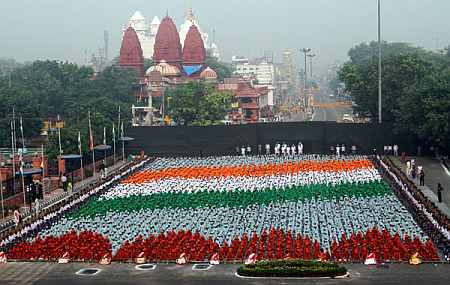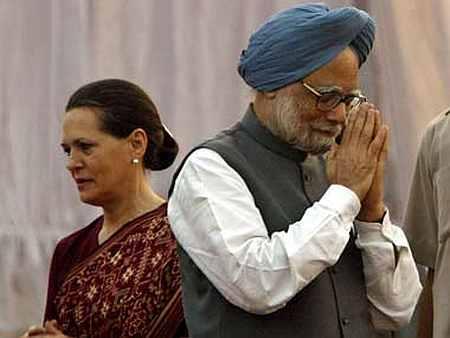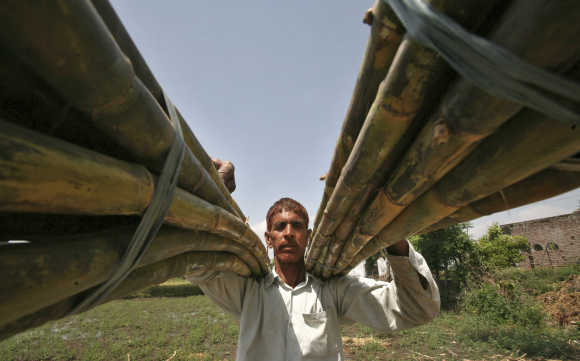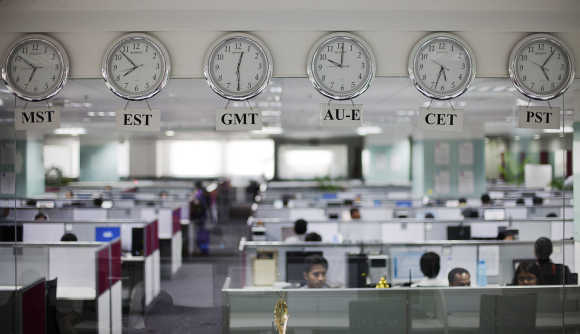Photographs: Adnan Abidi/Reuters N Chandra Mohan
Reducing the cost of doing business may put us back on track, writes N Chandra Mohan
The cumulative impact of flagging investments that set in during 2011-12 has taken the shine off the India growth story.
The pace of gross fixed capital formation at 2004-05 prices was negative at 0.2 per cent during April-December 2011 against 8.9 per cent in April-December 2010.
The share of aggregate capital formation, thus, dropped to 30.6 per cent of GDP from 32.8 per cent.
Corporate investment intentions have dried up and the situation is expected to improve slowly in 2012-13. Project finance data also show a downtrend, according to the Reserve Bank of India.
. . .
Is India's growth story going awry?
Photographs: Fayaz Kabli/Reuters
This dropped to 6.9 per cent in the July-September quarter and 6.1 per cent in the October-December quarter.
Indications are that overall growth will be around seven per cent in fiscal 2011-12.
Policymakers are obviously concerned about the economy's sharp deceleration at a time when the global economic outlook remains fragile owing to turmoil in the crisis-ridden Euro zone.
. . .
Is India's growth story going awry?
Photographs: Punit Paranjpe/Reuters
Prime Minister Manmohan Singh keeps stating that investment is an act of faith. But the weak numbers appears to indicate that investors, Indian and foreign, are losing faith in the India story.
To be sure, they are worried about the extremely slow pace of decision-making and policy drift, if not paralysis.
Reform is at a standstill because of coalition compulsions. Chief Economic Advisor Kaushik Basu's recent comments on these matters at the Carnegie Endowment for International Peace were spot on and needn't have triggered any controversy.
. . .
Is India's growth story going awry?
Photographs: Reuters
Whatever Basu stated in his speech figured in the International Monetary Fund's Article IV consultations with the Indian government this year.
This institution usually has bilateral discussions with member countries every year.
The report for 2012, released in April, highlights that weak investment has been affected by governance concerns and policy uncertainty: "Many investors have been disappointed by the pace of reform of the present government coalition. . . and more recently have become concerned about slower government decision-making following high profile governance scandals and increased civil activism."
India: 2012 Article IV Consultation - Staff Report, Staff Statement and Supplements" Public Information Notice on the Executive Board Discussion; and Statement by the Executive Director for India.
. . .
Is India's growth story going awry?
Photographs: Reuters
Clearly, the big challenge for the government is to revive investment, especially private corporate investments, so that the economy returns to its earlier rapid growth trajectory of eight per cent to nine per cent a year.
Before the global financial crisis of 2008-09, booming corporate investments were behind the India growth story.
But thereafter they declined sharply from the pre-crisis level of 14 per cent of GDP to 10 per cent of GDP adversely impacting growth, according to a recent IMF working paper by Kiichi Tokuoka titled 'Does the Business Environment Affect Corporate Investment in India?'
. . .
Is India's growth story going awry?
Image: A farmer carries sugarcane from a field on the outskirts of Jammu.Photographs: Mukesh Gupta/Reuters
Tokuoka admits that macroeconomic factors such as the weaker global outlook may be weighing on investor sentiment.
RBI's tightening since 2010 also affected investments at the margin.
But his main point is that structural factors like the "still unfavourable business environment, weakening governance, and slower government project approvals may be depressing investment.
Costs of doing business in India remain one of the highest in the world, and according to the World Economic Forum, in recent years, an increasing number of people are concerned about weakening governance in India".
Structural factors assume importance since macroeconomic factors cannot fully account for the dismal investment data.
. . .
Is India's growth story going awry?
Image: Workers are pictured beneath clocks displaying time zones in various parts of the world at an outsourcing centre in Bengaluru.Photographs: Vivek Prakash/Reuters
Tokuoka uses micro-level panel data that suggest that improving the business environment by reducing costs of doing business, upgrading the financial system and developing infrastructure stimulates corporate investments.
Given the substantial variability in these areas within the country -- as reflected in the World Bank's Doing Business indicators that are available at a disaggregated level for important cities in India for 2005, 2007 and 2009 -- India can learn from itself.
To be sure, some of these indicators like the rates of corporate taxes and labour regulation do not vary much across cities.
But others like the costs of starting a business, registering property and costs of exports excluding tariffs and enforcing contracts do vary substantially.
. . .
Is India's growth story going awry?
Image: Workers spread wheat to dry at a wholesale grain market in Chandigarh.Photographs: Ajay Verma/Reuters
If the various cities can learn from the best performers, according to these indicators, corporate investment would go up substantially by three per cent to 13.5 per cent through raising profitability.
Reducing the costs of doing business, thus, makes a big difference.
To arrest the weakening trend of investment and overall growth, the upshot is to improve the business environment.
Reforms in the financial and infrastructure sectors are also imperative.
Unless these second-generation reforms are implemented, risks of a further slowdown over the medium term will persist.
More investments will not flow in unless the hassle-component of the regulatory apparatus is reduced and decision-making is speeded up so that India retains its status as the world's second-fastest growing economy.
From the Ivory Tower will make research from the academic world accessible to all our readers










article